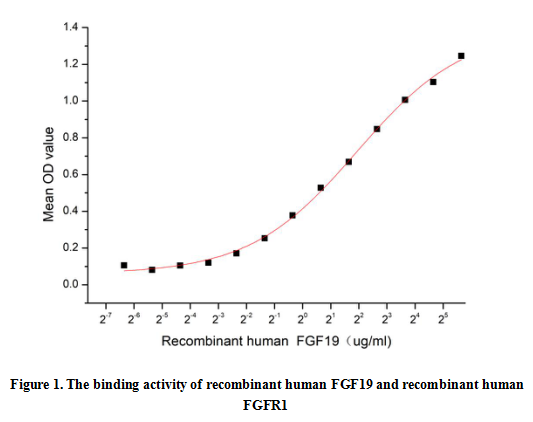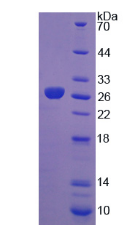Active Fibroblast Growth Factor 19 (FGF19)
- Product No.APC917Hu01
- Organism SpeciesHomo sapiens (Human) Same name, Different species.
- Buffer FormulationPBS, pH7.4, containing 0.01% SKL, 5% Trehalose.
- Traits Freeze-dried powder
- Purity> 90%
- Isoelectric Point6.6
- ApplicationsCell culture; Activity Assays.
- DownloadInstruction Manual
- UOM 10µg50µg 200µg 1mg 5mg
- FOB
US$ 167
US$ 418
US$ 836
US$ 2508
US$ 6270
For more details, please contact local distributors!
ACTIVITY TEST

Fibroblast Growth Factor 19 (FGF19) is a member of the fibroblast growth factor (FGF) family. FGFs are heparin-binding growth factors with a core 120 amino acid (aa) FGF domain that allows for a common tertiary structure. In general, FGFs are expressed during embryonic development and in restricted adult tissues.Human FGF-19 cDNA predicts a 251 aa precursor protein with a 22 aa signal peptide and a 229 aa secreted mature protein with no potential N-linked glycosylation sites. FGF19-FGFR1 is one of paired transcripts mediating the dialogues between extraembryonic membrane and endometrium. Thus a functional binding ELISA assay was conducted to detect the interaction of recombinant human FGF19 and recombinant human FGFR1. Briefly, FGF19 were diluted serially in PBS, with 0.01% BSA (pH 7.4). Duplicate samples of 100 µl were then transferred to FGFR1-coated microtiter wells and incubated for 2h at 37℃. Wells were washed with PBST and incubated for 1h with anti-FGF19 pAb, then aspirated and washed 3 times. After incubation with HRP labelled secondary antibody, wells were aspirated and washed 3 times. With the addition of substrate solution, wells were incubated 15-25 minutes at 37℃. Finally, add 50 µL stop solution to the wells and read at 450 nm immediately. The binding activity of recombinant human FGF19 and recombinant human FGFR1 was shown in Figure 1, the EC50 for this effect is 3.83 ug/mL.
USAGE
Reconstitute in 10mM PBS (pH7.4) to a concentration of 0.1-1.0 mg/mL. Do not vortex.
STORAGE
Avoid repeated freeze/thaw cycles. Store at 2-8°C for one month. Aliquot and store at -80°C for 12 months.
STABILITY
The thermal stability is described by the loss rate. The loss rate was determined by accelerated thermal degradation test, that is, incubate the protein at 37°C for 48h, and no obvious degradation and precipitation were observed. The loss rate is less than 5% within the expiration date under appropriate storage condition.
GIVEAWAYS
INCREMENT SERVICES
-
 BCA Protein Quantification Kit
BCA Protein Quantification Kit
-
 Molecular Mass Marker for Protein
Molecular Mass Marker for Protein
-
 Monoclonal Antibody Customized Service
Monoclonal Antibody Customized Service
-
 Polyclonal Antibody Customized Service
Polyclonal Antibody Customized Service
-
 Protein Activity Test Experiment Service
Protein Activity Test Experiment Service
-
 Electrophoretic Mobility Shift Assay (EMSA) Experiment Service
Electrophoretic Mobility Shift Assay (EMSA) Experiment Service
-
 Buffer
Buffer
-
 Lentivirus Packaging Experiment Service
Lentivirus Packaging Experiment Service
-
 Adenovirus Packaging Experiment Service
Adenovirus Packaging Experiment Service
-
 Real Time PCR Experimental Service
Real Time PCR Experimental Service
-
 Spike RBD Protein (S-RBD)
Spike RBD Protein (S-RBD)
-
 Protein G
Protein G
-
 Protein A
Protein A
| Magazine | Citations |
| The Journal of Nutritional Biochemistry | Raspberry pomace alters cecal microbial activity and reduces secondary bile acids in rats fed a high-fat diet. pubmed:28437712 |
| Catalog No. | Related products for research use of Homo sapiens (Human) Organism species | Applications (RESEARCH USE ONLY!) |
| EPC917Hu61 | Eukaryotic Fibroblast Growth Factor 19 (FGF19) | Positive Control; Immunogen; SDS-PAGE; WB. |
| RPC917Hu01 | Recombinant Fibroblast Growth Factor 19 (FGF19) | Positive Control; Immunogen; SDS-PAGE; WB. |
| APC917Hu61 | Active Fibroblast Growth Factor 19 (FGF19) | Cell culture; Activity Assays. |
| RPC917Hu02 | Recombinant Fibroblast Growth Factor 19 (FGF19) | Positive Control; Immunogen; SDS-PAGE; WB. |
| APC917Hu01 | Active Fibroblast Growth Factor 19 (FGF19) | Cell culture; Activity Assays. |
| PAC917Hu01 | Polyclonal Antibody to Fibroblast Growth Factor 19 (FGF19) | WB; IHC |
| MAC917Hu21 | Monoclonal Antibody to Fibroblast Growth Factor 19 (FGF19) | WB; IHC; ICC; IP. |
| SEC917Hu | ELISA Kit for Fibroblast Growth Factor 19 (FGF19) | Enzyme-linked immunosorbent assay for Antigen Detection. |
| SCC917Hu | CLIA Kit for Fibroblast Growth Factor 19 (FGF19) | Chemiluminescent immunoassay for Antigen Detection. |
| LMC917Hu | Multiplex Assay Kit for Fibroblast Growth Factor 19 (FGF19) ,etc. by FLIA (Flow Luminescence Immunoassay) | FLIA Kit for Antigen Detection. |








